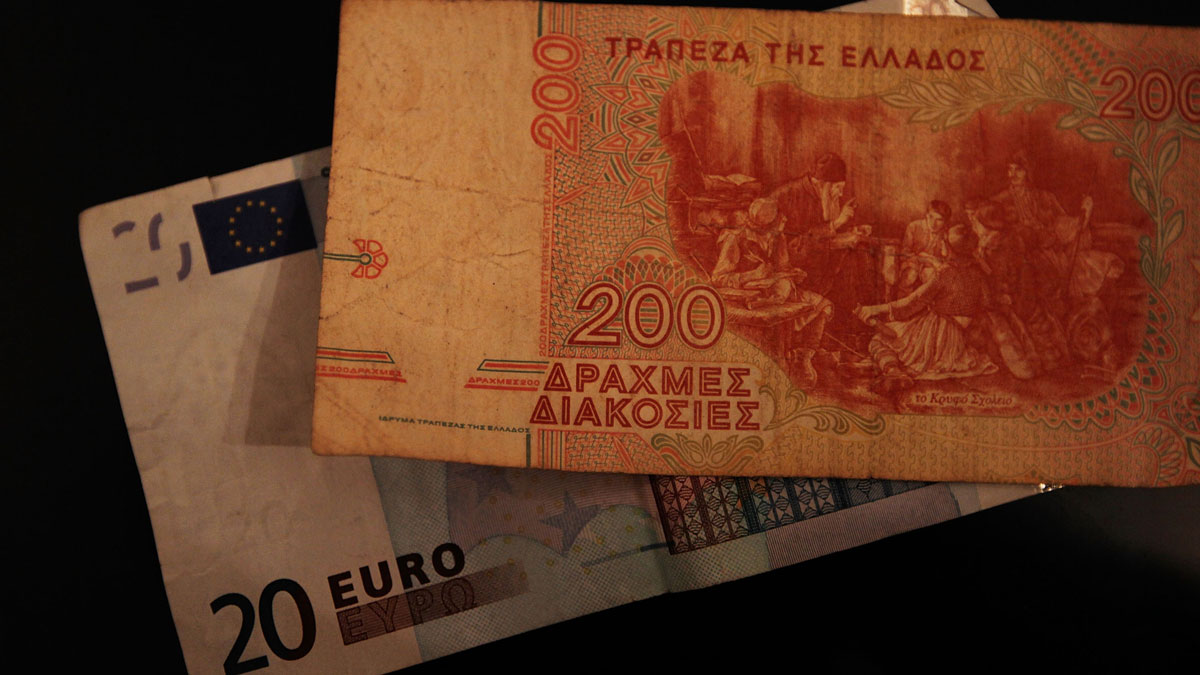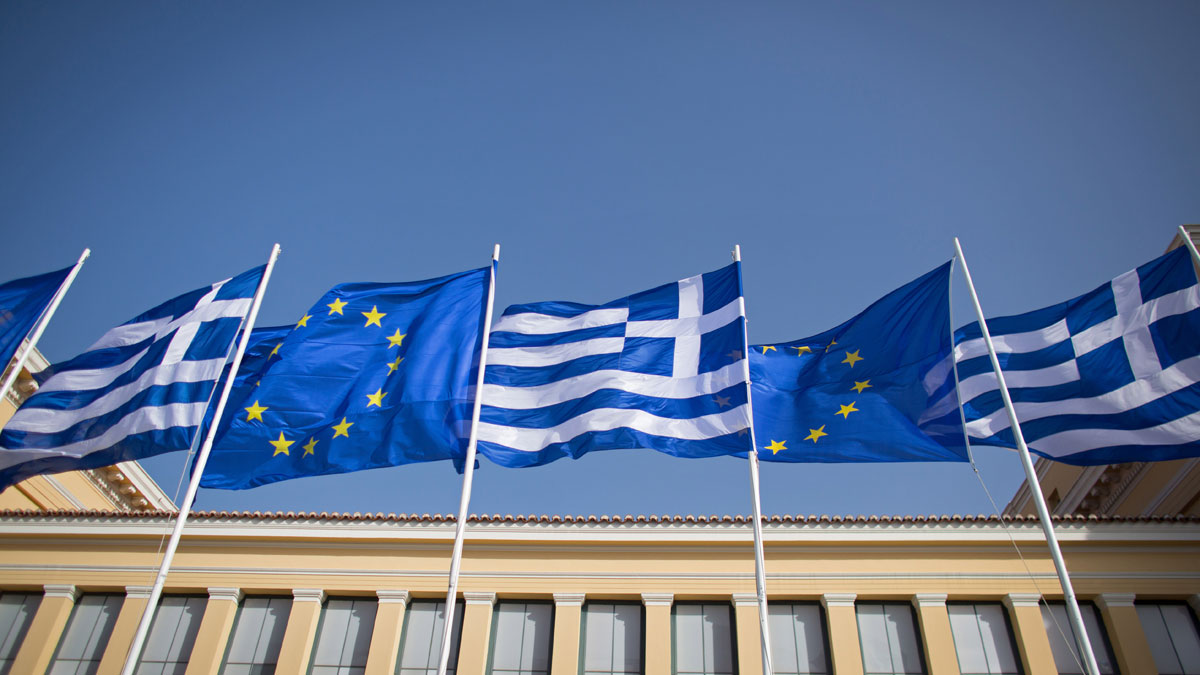Greece finally reaches deal to release €12bn bailout funds
ECB stress tests show country's banks needs €14bn to fill a capital shortfall

A free daily email with the biggest news stories of the day – and the best features from TheWeek.com
You are now subscribed
Your newsletter sign-up was successful
Greece crisis: Germany isolated in bailout talks
10 August
Germany is looking increasingly isolated in bailout discussions with stricken eurozone partner Greece, as some reports suggest a third bailout could be agreed as soon as Tuesday.
The Financial Times reports that Greek negotiators and international creditors are closing in on a fresh agreement, as "significant concessions" in the past month by Alexis Tsipras's government have convinced even the likes of hawkish Finland to break with Berlin. Germany, however, still "wants to hold out longer to squeeze more reforms from Athens".
The Week
Escape your echo chamber. Get the facts behind the news, plus analysis from multiple perspectives.

Sign up for The Week's Free Newsletters
From our morning news briefing to a weekly Good News Newsletter, get the best of The Week delivered directly to your inbox.
From our morning news briefing to a weekly Good News Newsletter, get the best of The Week delivered directly to your inbox.
A spokesperson for the Greek delegation suggested agreement could be reached tomorrow, which would allow time for approval by finance ministers later in the week and for the deal to be ratified in the parliaments of Greece, Germany and elsewhere before a €3.2bn bond repayment falls due to the European Central Bank on 20 August. Officials from the European Commission will say only that a final deal could be done to meet this deadline.
However, the Daily Telegraph reports that Ralph Brinkhaus, deputy parliamentary floor leader of Chancellor Angela Merkel's conservatives, told German radio on Monday that "a lot of questions" remain and that a bridging loan while negotiations continue would be preferable to a "bad deal".
Among sticking points for Germany is participation in a new bailout package by the International Monetary Fund, which has demanded substantial debt relief that Merkel is reluctant to offer before seeing proof that economic reforms have been implemented. Reuters says Brinkhaus also raised the issue of how large an initial payment to Greece should be, with Germany favouring €20bn to give greater "leverage" on enforcing terms while other creditors believe up to €35bn is needed.
One EU official told the FT Merkel "would not want Berlin isolated", indicating that she could soften her stance. The paper adds that other "sticking points" still being discussed include "details of a €50bn privatisation plan" and proposals to raise a required budget surplus before debt repayments to 3.5 per cent in 2018 from zero this year
A free daily email with the biggest news stories of the day – and the best features from TheWeek.com
Hopes of a new deal gave stocks in Athens a lift on Monday morning, on the back of two positive sessions after steep losses at the beginning of last week.
[[{"type":"media","view_mode":"content_original","fid":"83712","attributes":{"class":"media-image"}}]]
Greece crisis: bailout hopes trump poor data
7 August
New figures have further highlighted the implosion in Greek finances as tax revenues plummet - but did not prevent its stock market closing in the black.
The Guardian reports tax revenues over the six months to June fell 8.5 per cent as the economy, which is expected to contract by as much as seven per cent this year, stalled. Worse may be to come: there is already evidence the imposition of stringent capital controls prompted a record decline in manufacturing orders and business activity in July.
The figures, published yesterday by the Greek treasury, also showed public spending fell by 12.3 per cent, "even before the new austerity measures the prime minister Alexis Tsipras has been forced to pass" to enter discussion on a new bailout.
In spite of the latest data, Greek shares closed up by 3.65 per cent, which the Daily Telegraph says reflects growing hopes the government and its international creditors "can thrash out the terms of a fresh €86bn rescue package in just under two weeks" before the country needs to pay €3.3bn to the European Central Bank on August 20.
Greece's beleaguered banks enjoyed a strong rally, rising close to 18 per cent. This, however, followed a three-day rout and the wider sector is still nursing losses for the week in excess of 50 per cent. The Athens market's banking index is now worth 96 per cent less than at its peak before the financial crisis in 2007.
Optimism over a third bailout deal is running high on the back of comments from officials on both sides that an accord should be possible before emergency bridging loans are required to repay the ECB bond – and despite a threat from the International Monetary Fund to pull out unless sufficient debt relief is offered.
Greece crisis: eurozone resilient despite Greek slowdown
7 August
Further evidence that the wider eurozone is more insulated now than in previous years to the debt crisis in Greece has been provided by official monthly data showing only a minimal slowdown in manufacturing activity in July.
The Times reports that the Markit purchasing managers' index (PMI) for last month slowed only marginally from 54.2 to 53.9, where any score above 50 indicates expansion in manufacturing and services activity. The data point to third-quarter general economic expansion of 0.4 per cent, "in line with the expectations for the previous three months", and the eurozone remains "on track to meet forecasts for 1.5 per cent economic growth this year".
This is despite a massive slowdown in Greece during a period of stringent capital controls, which was indicated by a huge slowdown in the country's own PMI to a record low of a little above 30. The newly re-opened Athens shares index plummeted this week as concerns over the economy and pent-up anxiety prompted a major selloff, but after steep falls for banks, in particular, both the wider index and the banking index are in the black in Thursday trading.
Eurozone data did show a divergence in fortunes for the 'big four' economies in the 19-country single-currency bloc, with The Guardian reporting that Spain was the best performer in July with expansion suggesting quarterly growth of one per cent, while the Financial Times notes Germany is showing "above-average" expansion but that "slowing growth in France and Italy dragged down the regional number".
More positive news from Greece can be found in estimates of tourist activity, with Reuters citing predictions that "arrivals this year will exceed last year's record of nearly 21 million" and that some estimates "put it at around 25 million". Tourism makes up around a fifth of the economy.
There were further positive noises from ongoing talks on a third bailout, which Greek Prime Minister Alexis Tsipras has said are "in the final stages", according to the Daily Telegraph. Officials from the European Commission have also indicated a deal could be reached ahead of a crucial repayment deadline on 20 August.
Greece crisis: Debt 'haircut' of 55% needed, says think tank
5 August
Greece's debt pile must be reduced by substantially more than the amounts currently being discussed and as much as €95bn to meet thresholds for sustainability set by the International Monetary Fund, a UK-based think tank has said.
A report published by the International Institute of Economic and Social Research warns that a renewed slump in the Greek economy would leave output 30 per cent down on its 2007 peak by the middle of next year, The Daily Telegraph reports.
To get its €320bn debt pile under control, Greece will therefore need major relief to reduce an eye-watering 187 per cent debt-to-GDP ratio to 130 per cent, giving the country a chance of meeting the IMF target of 120 per cent by 2020.
The report's authors note this implies a 'haircut' equivalent to 55 per cent of GDP, The Guardian reports, higher than the IMF's estimate of 30 per cent. Even this latter figure, seen as key to the fund participating in a third bailout, is proving a stumbling block. Germany, in particular, is thought to be reluctant to offer further concessions until it has proof reforms are being implemented.
A cut to the "face value" of loans has already been ruled out, which leaves the options of reducing interest rates or extending maturities to effectively defer servicing the debt. The report's authors told the Telegraph a "very significant extension" on debt repayments would be needed that would take its rescue payments "a long way" into the future.
Talks are ongoing against a backdrop of brutal losses on newly re-opened stockmarkets for Greek banks, which lost about half of their value in two sessions and are nursing collective losses of around 23 per cent again in Wednesday trading. The wider market posted a record fall of more than 16 per cent on Monday in the wake of weak economic data, but has since stabilised and would be in modest positive territory were it not for the rout on its cash-starved banks.
Negotiations are generally said to be "going well", according to the Greek newspaper Kathimerini. It said spokespeople from both sides expressed confidence a 20 August deadline for a bond repayment to the European Central Bank would be met, pointing to remaining issues that include the creation of a new privatisation fund, the phasing out of early retirement, the target for this year's primary budget balance and the settlement of non-performing loans.
Greece crisis: bank shares collapse masks economic 'freefall'
4 August
Banking shares are being hammered again on the second trading day after five-week closure
Shares in Greek banks are once again being hammered on the second trading session at the Athens stock exchange after a five-week closure, with many again hitting limits on single-day losses.
Blue chip shares on the Athens index fell by a record 16.2 per cent on Monday, Reuters reports, as it opened for the first time since prime minister Alexis Tsipras announced the market closure alongside restrictions on access to bank deposits in late June. Pent up negativity surrounding cash-starved banks was expressed in a major sell-off which saw all three of the country's main lenders shed the maximum daily loss of 30 per cent, with similar falls again being recorded on Tuesday as the banking index as a whole plummeted a further 27 per cent.
The Daily Telegraph says the wider fall was catalysed by the release of data showing manufacturers suffered their "worst ever month in the single currency" in July, with new business orders "falling off a cliff". The purchasing managers index (PMI) registered a score of just 30.2. Anything below 50 represents contraction in the market and the score was the lowest in the 16 years the data has been collected, beating figures from the previous crisis of 2012.
The paper quotes Phil Smith, economist at Markit, who said the capital controls imposed by the Government after talks with creditors broke down were largely to blame for the drop, as "bank closures and capital restrictions badly hampered normal business activity".
Writing in The Times, Louise Cooper says that while the stock market falls have "grabbed headlines" the PMI fall was "far more significant" and could affect the size of Greece's bailout. After data last week showed business confidence and consumer confidence are worse than expected the new figures show an "economy in freefall" and that could "increase substantially the financial aid required" from the €86bn third bailout currently being discussed.
The Telegraph said the economy could contract as much as seven per cent this year.
For the Greek government the priority now is to secure the next bailout in order to begin the process of normalising its economy. According to The Guardian, Greece is hoping for a new deal by 18 August, which would see it avoid the need for further emergency 'bridging loans'. But some suggest that timetable is optimistic.
Greece crisis: banks slump as stock market re-opens
03 August
Shares on Greece's blue chip stock index, and especially banking stocks, were hit hard in early trading on Monday after the Athens exchange re-opened for the first time since capital controls were imposed at the height of a bailout impasse in June.
The BBC had reported the index was set to open around 20 per cent down after the five-week closure, as a result of "pent-up trading and fears about Greece's worsening economy". In the event shares opened down 22.8 per cent, the Daily Telegraph notes, with banks in particular suffering a "bloodbath" that has seen shares nosedive by around 30 per cent.
In an effort to prevent a spiralling of losses, Reuters quotes an unnamed source at the Greek securities regulator as saying a ban on short-selling introduced alongside stringent capital controls in the final days of June is set to be extended.
Prime Minister Alexis Tsipras closed the Athens index and introduced capital controls, including limits on bank withdrawals and a ban on moving money overseas, as the European Central Bank froze a critical credit line to its banking sector after talks on extending its previous bailout agreement with international creditors broke down. Most capital controls remain in place as discussions over a controversial third bailout that was agreed in principle last month continue.
Formal negotiations begun afresh late last week in the wake of legislation on reforms demanded by creditors being passed in the Greek parliament. But already the discussions have hit stumbling blocks, including the International Monetary Fund threatening to pull out if significant debt relief is not agreed.
Reuters says Greece is likely to demand up to €24bn in an initial tranche of aid this month to prevent it defaulting on a €3.2bn bond repayment to the ECB and to enable it to refinance Greek banks, which remain desperately short of cash. However, there are doubts in some quarters that a deal can be agreed to that timetable and that further 'bridging' loans may be needed from emergency EU funds.
Greece crisis: IMF hardens debt relief stance
31 July
It was another dramatic day in the saga between stricken Greece and international creditors over a €86bn third bailout.
In what amounts to a hardening of previous statements, an official at the International Monetary Fund stated yesterday it would not participate until it receives explicit assurances over debt sustainability.
According to the Daily Telegraph, this means guarantees Greece can carry out a "comprehensive" set of reforms and that it will be the "beneficiary of debt relief from its European creditors".
This follows revelations from the Financial Times that Greece does not technically qualify for IMF support because of its "high debt levels and poor record of implementing reforms".
This could significantly delay a decision by the fund's board, which could derail any deal given Germany's stance that IMF involvement is essential and a tight timetable to avoid a default at the end of August.
Greece has long declared there must be significant concessions on its debt pile, including relaxing repayment deadlines and reducing interest rates.
German chancellor Angela Merkel has previously said this could only happen once it has proof reforms have been successfully enacted.
However, she may be forced to relax this position to prevent negotiations falling apart before they have really begun.
Earlier in the day another threat was headed off after the central committee of prime minister Alexis Tsipras's Syriza party decided against holding a second bailout referendum this weekend.
The poll of party members was offered as a challenge to dissenters by Tsipras to quell a rebellion, but a No vote would have risked bringing down the government at a critical moment in negotiations.
The FT says instead the party will go ahead with his "preferred" suggestion of a special congress in September "to examine the bailout once it has been completed".
Greece crisis: Tsipras proposes second bailout referendum
30 July
Greek prime minister Alexis Tsipras has thrown down a gauntlet to rebels within his Syriza party – and injected fresh jeopardy into ongoing talks on a third bailout – by proposing a referendum of party members on a deal agreed with creditors.
In a confrontational speech to the party's congress in Athens, Reuters says Tsipras challenged dissenters who think "they could have achieved a better deal" to "come out and say that".
He proposed that internal disagreements should be resolved by holding an 'emergency congress' to discuss longer-term strategy in September, after negotiations with creditors will have concluded. But in response to calls from some quarters for an "immediate solution", he offered the vote as an alternative, to be held this Sunday.
He referred to the option as a 'referendum', but rather than a public poll this time only Syriza members would vote. While it would not carry the same significance as the original bailout referendum, if a sizeable mutiny undermined the government it could prompt fresh elections and throw talks on a new €86bn rescue into chaos.
The Financial Times says the offer is an attempt to head off growing unrest within the governing party, coming in particular from a faction known as Left Platform which has openly argued that Greece should have rejected the creditors' offer and returned to the drachma. It will now be down to the party's central committee to decide whether the referendum should go ahead.
About 30 out of Syriza's 149 MPs voted against the government on two key bills earlier this month, which introduced reforms demanded by Eurozone partners and the IMF to open new bailout talks. This has pushed the government close to thresholds that might see it lose a confidence vote, although it could probably count for the time being on pro-European opposition parties.
Elsewhere, another barrier to closing a deal has emerged. The FT reveals that a confidential analysis presented to the IMF board has determined that Greece does not qualify for aid from the fund because of its high debt levels and poor record of implementing reforms. While this does not preclude IMF involvement, seen as critical by Germany, it does mean that the fund may "not decide whether to agree a new programme for months – potentially into next year".
Greece crisis: Tsipras revives Grexit threat
29 July
Greek prime minster Alexis Tsipras has revived the threat of a 'Grexit' and break-up of the eurozone, as he demanded significant debt concessions as part of a third bailout deal currently being negotiated.
During a radio interview in Greece, The Guardian reports, Tsipras told listeners that the risk of the country leaving the single currency would not be removed until a deal was secured – and that debt "forgiveness" would be a key issue.
Debt relief has become a central issue in negotiations, which started earlier this week, after the International Monetary Fund said that relaxing payment terms would be the minimum concession required to make any new deal "sustainable".
The backdrop to the ongoing talks could not be more strained. At home Tsipras is facing down a group of 30 or so rebel MPs ahead of a meeting of his Syriza party's central committee on Thursday. He warned during the interview that if further defections eroded his parliamentary majority, elections could be called. This would complicate already delicate discussions.
Tsipras is also attempting to distance himself from an escalating war of words over former minister Yanis Varoufakis's admission that he authorised a 'hack' into the Greek tax office, as he lined up contingency plans to re-introduce the drachma.
Greece's state prosecutors have set their sights on Varoufakis, the Daily Telegraph reports, with the country's Supreme Court putting cases before the Greek parliament after complaints from opposition conservative MPs. Varoufakis has immunity from prosecution as an MP, but this can be overturned by parliament.
The former finance minister has said the charges are an attempt to "annul the first five months of this government and put it in the dustbin of history", and denies that he was engaged in a surreptitious attempt to bring about a Greek exit from the euro.
Greece crisis: Varoufakis set up 'Plan B' currency with tax hack
27 July
Greece's controversial former finance minister Yanis Varoufakis has admitted he assembled a team, which hacked into the country's tax office before Syriza won power in January, in order to create a parallel currency as part of what he called a 'Plan B' for the economy.
In a transcript from a conference call with international investor groups including hedge funds and sovereign wealth funds, published by conservative Greek newspaper Kathimerini, Varoufakis is quoted as saying party leader and now prime minister Alexis Tsipras had given the go ahead for the operation.
He said he recruited a "childhood friend" who is an expert in computers and a professor at Columbia University to hack into the tax office when it was under the control of Greece's 'troika' of creditors.
This was to enable his team to create "reserve accounts" for every individual and business across the country, for which they would require unique tax identification numbers. This emergency system could have been used to process payments in the event European partners pulled liquidity.
In the event the European Central Bank did just that in June when talks broke down after a referendum on bailout terms was called, but the plan was not put into effect. Varoufakis told the Daily Telegraph he had learnt Tsipras would not go ahead on the night of the vote, prompting his offer to resign. He stood down around a week before the conference call took place.
Varoufakis told the Telegraph the transcript was accurate, but that the plan had never been a so-called 'Grexit' from the euro but rather an alternative solution while negotiations were ongoing. He added that his remarks had been twisted in the Greek press "to present me as a rogue finance minister, and have me indicted for treason".
The revelation gives an insight into how fraught the relationship between Syriza and Greece's creditors has been, and comes as reports indicate negotiations on a third bailout deal have already run into problems as Greek government departments have offered only limited access to creditor 'monitors'.
Negotiators flew into Athens today to begin talks, but the Financial Times reports Greek officials have said only middle-ranking technical teams and not mission chiefs would participate for now, despite an agreement to grant full access to staff and facilities.
-
 Political cartoons for February 3
Political cartoons for February 3Cartoons Tuesday’s political cartoons include empty seats, the worst of the worst of bunnies, and more
-
 Trump’s Kennedy Center closure plan draws ire
Trump’s Kennedy Center closure plan draws ireSpeed Read Trump said he will close the center for two years for ‘renovations’
-
 Trump's ‘weaponization czar’ demoted at DOJ
Trump's ‘weaponization czar’ demoted at DOJSpeed Read Ed Martin lost his title as assistant attorney general
-
 Majority of Greeks regret joining euro
Majority of Greeks regret joining euroSpeed Read Fifty-three per cent say it was 'wrong' to join single currency - and feeling is strongest among the young
-
 US stock markets fall after Greek vote
US stock markets fall after Greek voteSpeed Read Wall Street slide mirrors falls in Asia and Europe as global 'Grexit' jitters take hold
-
 'Leap' second: how much was it worth?
'Leap' second: how much was it worth?In Depth During yesterday's extra second, Apple earned about twice the average UK weekly salary
-
 Greek crisis: a case of history repeating itself
Greek crisis: a case of history repeating itselfIn Depth If Greece leaves the euro, it won't be the first monetary exit for the Hellenic Republic
-
 Greece crisis: has bailout ended threat of Grexit?
Greece crisis: has bailout ended threat of Grexit?In Depth Economic targets remain ambitious and the political situation is far from settled